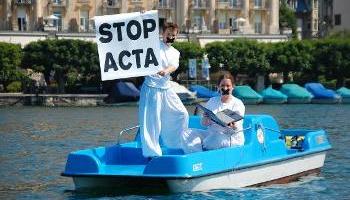As international negotiators meet in Switzerland to discuss the highly controversial Anti-Counterfeiting Trade Agreement (ACTA), French advocacy group La Quadrature du Net is asking people to sign a petition calling for the urgent rethinking of patent and copyright clauses.
ACTA is a proposed treaty for establishing international standards on intellectual property rights enforcement. The scope of the agreement is broad, including counterfeit goods, generic medicines and “piracy over the Internet”. Countries will be given the option to join up to the agreement on a voluntary basis, and those that do will be able to refer cases of copyright infringement to an independent governing body.
Penalties for infringement
Various versions of the ACTA text were leaked in 2008, 2009 and 2010, before the negotiating parties published the official version (PDF) of the current draft on 20 April 2010. The ACTA ‘Criminal Provisions’ chapter states that, for crimes of copyright infringement, “each party shall provide effective proportionate and dissuasive penalties”.
These could include “imprisonment” and “monetary fines [sufficiently high to provide a deterrent to future acts of infringement, with a view to removing the monetary incentive of the infringer]”.
The document also suggests that provisions must be made for those who are believed to have “incited, aided and abetted” copyright infringement. However, according to Jérémie Zimmermann, spokesperson for La Quadrature du Net, this is “a notion so broad it could cover any Internet service or speech questioning copyright policies”.
“The ACTA negotiators play with repressive legislation attacking our freedoms like others play poker,” said Zimmermann in a statement. “It is urgent to react and hold them accountable. Otherwise, we would implicitly accept that the future of the Internet is negotiated behind closed doors rather than democratically debated.”
Opposition mounting
 La Quadrature staged a protest outside the Luzern Palace earlier this week, and is now calling on people to sign an open letter to negotiating governments, claiming that “ACTA belongs to the past”.
La Quadrature staged a protest outside the Luzern Palace earlier this week, and is now calling on people to sign an open letter to negotiating governments, claiming that “ACTA belongs to the past”.
“Whatever the final text will be after the next negotiation rounds, the Anti-Counterfeiting Trade Agreement (ACTA) will remain an illegitimate agreement, by its elaboration process (beyond any democratic control) as well as its content,” the group states. “In the age of globalized exchanges, the sharing of information improves our societies and saves lives. ACTA is emblematic of an outdated repression of the sharing of information and knowledge.”
La Quadrature calls on decision-makers to rethink copyright from scratch to allow democratic participation and sharing of information, while guaranteeing fundamental freedoms. It also demands a rethink of the patent system.
Last month, Free Software Foundation (FSF) president Richard Stallman also spoke out against ACTA, claiming that it unfairly punishes suspected file-sharers and could block anti-digital rights management software. He too started a petition, that can be found here.
“This is a time for people to show – in as many ways as possible – that they value the freedoms ACTA threatens. The more signatures and visible support we have, the weaker ACTA will look,” he said.
Wheels in motion
Movements are also being made in other arenas to find a fair solution to the problem of online copyright. In April, EC vice president Neelie Kroes said that the failure of governments and content producers to agree on common standards and platforms across Europe was directly contributing to illegal file-sharing. “For the moment one could almost say that the only existing Digital Single Market for audiovisual material is the illegal one,” she said.
Kroes reiterated the need to break down barriers to free trade in Europe, which are preventing consumers from accessing legal platforms such as iTunes and Spotify. “This will strike a blow against piracy to the benefit of authors and artists, and without endangering the open architecture that is essential for the Internet’s utility,” she said.
Meanwhile, under the new British government, plans are in motion to implement the Digital Economy Act – despite widespread opposition from privacy groups and companies including BT and TalkTalk.
The regulator Ofcom has published a draft of its code of practice for tackling copyright infringement over the Internet, including a ‘three strikes’ rule, which could see persistent infringers being taken to court for illegal file-sharing. Ofcom said the code should come into force in early 2011.




